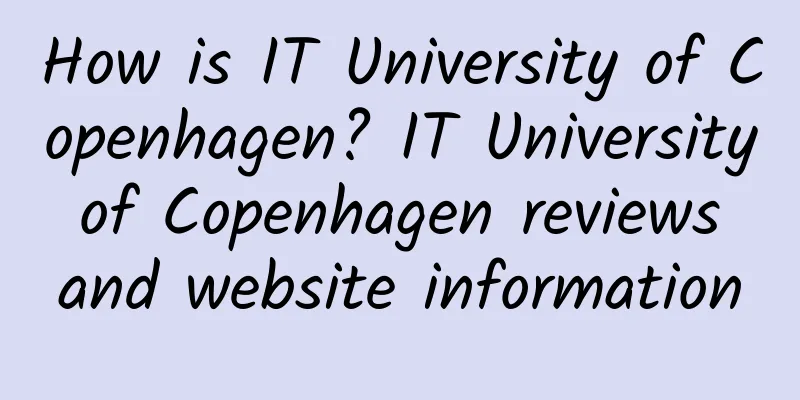How is IT University of Copenhagen? IT University of Copenhagen reviews and website information

|
What is the website of IT University of Copenhagen? IT University of Copenhagen (ITU) is a young public information technology college in Denmark. It was founded in 1999 and upgraded to the twelfth and most specialized comprehensive university in Denmark in 2003. It has been accredited by the Ministry of Education of China and provides undergraduate and postgraduate professional courses. Website: www.itu.dk IT University of Copenhagen: A pioneer in future technology educationIn the era of rapid technological change, higher education institutions play a vital role. They are not only the center of knowledge dissemination, but also the engine of technological progress and social development. IT University of Copenhagen (ITU) is such a top institution dedicated to cultivating future IT leaders. As one of the youngest public IT schools in Denmark, ITU is famous for its innovative teaching concepts, outstanding research results and international vision. Founded in 1999, IT University of Copenhagen is located in Copenhagen, the capital of Denmark, a vibrant and creative city that provides students with a unique learning environment. Since its establishment, IT University has focused on cutting-edge research and practical applications in the field of information technology with "technology and people in the information society" as its core mission. In 2003, IT University was officially upgraded to a comprehensive university, becoming the twelfth university in Denmark and the only specialized university in the country with information technology as its main research direction. This status not only highlights its unique value in the academic community, but also has been recognized worldwide. Many national education departments, including the Ministry of Education of China, have certified its academic qualifications. As a young but promising university, ITU is known for its modern facilities, interdisciplinary cooperation model and high attention to social responsibility. The undergraduate and graduate courses offered by the school cover a number of popular fields such as computer science, data science, artificial intelligence, interactive design, etc., providing students with abundant choices and development space. In addition, ITU also pays special attention to the combination of theory and practice, and encourages students to transform what they have learned in the classroom into practical results through project cooperation, internship opportunities and entrepreneurial support. Today, IT University of Copenhagen has become an important force in information technology education in Europe and even the world. It not only attracts outstanding students from all over the world, but also provides a large number of high-quality professionals for the industry. Next, we will explore the history, academic characteristics, research achievements and internationalization strategy of this university in depth, and fully demonstrate its unique charm as a pioneer in future science and technology education. From start-up to take-off: the development of IT University of CopenhagenThe birth of IT University of Copenhagen (ITU) stems from the urgent need for IT education at the end of the 20th century. With the popularization of the Internet and the rise of the technological revolution, the curriculum of traditional universities can no longer meet the rapidly changing social needs. In order to fill this gap, the Danish government established ITU in 1999 to provide more professional and forward-looking IT education. This decision marked an important innovation in the Danish higher education system and also laid a solid foundation for ITU. In the first few years, ITU started with a flexible and experimental teaching method. The school adopted small classes, focused on teacher-student interaction, and introduced many innovative teaching methods. For example, teachers often used case analysis and practical projects to help students understand complex theoretical concepts. This practice-oriented teaching model quickly won the recognition of students and accumulated a good reputation for the school. In 2003, ITU reached an important milestone - it was officially granted university status and became the twelfth comprehensive university in Denmark. This upgrade not only meant greater responsibilities and higher standards, but also brought more resources and support to the school. Since then, ITU has gradually expanded its course range and strengthened cooperation with other universities and companies. At the same time, the school has also increased its investment in scientific research and established a series of research centers and laboratories to support teachers and students in conducting high-level research work. In recent years, ITU has continued to maintain a strong momentum of development. The school has continuously optimized the course structure and introduced courses in emerging technology fields, such as artificial intelligence, blockchain, and quantum computing. In addition, ITU has actively expanded its international cooperation network and established partnerships with many world-renowned universities, providing students with more opportunities for communication and learning. These efforts have gradually made ITU grow into a highly regarded information technology education hall. Looking back on the development history of the past two decades, we can see that IT University of Copenhagen has always kept pace with the times, constantly innovating and improving itself. From the initial start-up stage to the current mature stage, ITU has not only achieved its own leap, but also made important contributions to the development of information technology in Denmark and even the world. Core advantages: Academic characteristics and curriculum of IT University of CopenhagenThe reason why IT University of Copenhagen (ITU) has been able to stand out in just over 20 years and become a leader in the field of global information technology education is inseparable from its unique academic characteristics and carefully designed curriculum system. The core advantages of the school are mainly reflected in the following aspects: 1. Interdisciplinary integration: breaking traditional boundariesDifferent from traditional single-discipline education, ITU places great emphasis on interdisciplinary integration. The school believes that information technology is not an isolated field, but is closely linked to multiple disciplines such as social sciences, economics, and art design. Therefore, ITU's course design often combines technology with humanities to help students understand and solve problems from a broader perspective. For example, in the "Interaction Design" major, students not only need to master programming skills, but also need to learn knowledge such as psychology, aesthetics and user experience design. Such comprehensive training enables graduates to better adapt to the complex and changing working environment and be competent for a variety of roles from product development to user research. 2. Practice-oriented: both theory and applicationPractice is an important part of ITU's educational philosophy. The school firmly believes that only through real project experience can students truly master the knowledge they have learned and apply it to practical problems. To this end, ITU has established cooperative relationships with many companies and organizations, providing students with a large number of internship and project participation opportunities. For example, students majoring in "Data Science" can use real data for analysis and modeling through cooperative projects with the Danish National Bureau of Statistics or healthcare institutions. This immersive learning experience not only enhances students' professional capabilities, but also lays a solid foundation for their future career development. 3. Flexible courses: Personalized learning pathsIn order to meet the interests and needs of different students, ITU provides highly flexible course options. Students can customize their own learning plans according to their career plans and research interests. Whether focusing on a specific technical field or exploring multiple interdisciplinary directions, ITU can provide corresponding support. In addition, the school has launched a "dual degree" program, allowing students to simultaneously study for degrees in information technology and other related fields. This diversified learning model opens up a broader career path for students and makes them more competitive in the job market. 4. Frontier areas: Embracing new technology trendsAs a university focusing on information technology, ITU always maintains a high degree of sensitivity to emerging technologies. The school regularly updates course content to ensure that students can be exposed to the latest technological trends. Currently, artificial intelligence, machine learning, big data analysis and network security have become the key development directions of ITU. Taking the major of "Artificial Intelligence" as an example, ITU not only teaches basic algorithms and model building, but also pays attention to ethical issues and social impacts. This all-round perspective cultivates students' critical thinking and enables them to play a responsible role in technological development. In summary, IT University of Copenhagen has created an attractive and competitive education platform through its four core advantages of interdisciplinary integration, practice orientation, flexible courses and cutting-edge fields. These characteristics not only reflect ITU's deep understanding of future information technology education, but also provide students with the best way to realize their personal values and career goals. Research and innovation: the academic contribution of IT University of CopenhagenIT University of Copenhagen (ITU) is not only an educational institution, but also an active research center. With its profound accumulation and extensive influence in the field of information technology, ITU has achieved remarkable research results in many key areas and made important contributions to industry development and social progress. 1. Artificial Intelligence and Machine Learning: Shaping an Intelligent FutureArtificial intelligence (AI) is one of the hot topics in today's science and technology field, and ITU is in an international leading position in this regard. The school's AI research team focuses on developing efficient algorithms and models to solve complex problems in the real world. For example, in the field of medical diagnosis, ITU researchers have developed a deep learning-based system that can accurately identify early symptoms of cancer, thereby improving patient survival rates. In addition, ITU has made breakthrough progress in natural language processing (NLP). Researchers have designed an intelligent chatbot that can understand multiple languages and provide accurate services. This technology has been adopted by many companies to improve customer service experience. 2. Data Science and Big Data Analysis: Uncovering Hidden ValueWith the explosive growth of data, how to effectively manage and analyze this data has become an urgent problem to be solved. ITU's data science research team is committed to developing advanced tools and methods to help enterprises and society extract valuable information from massive data. One typical case is a cooperative project with the Danish Ministry of Transport. Using big data analysis technology, researchers optimized the scheduling of the public transportation system, significantly reduced congestion and improved passenger satisfaction. This achievement not only improved the travel experience of citizens, but also provided experience for other cities to learn from. 3. Cybersecurity and privacy protection: protecting the security of the digital worldIn the process of digital transformation, cybersecurity issues have become increasingly prominent. The ITU's security research group focuses on studying new attack methods and their defense strategies to ensure that user data and personal privacy are fully protected. Recently, the team has successfully developed a new encryption technology that can significantly improve the security of data transmission without sacrificing performance. This technology has been widely used in industries such as finance and medicine, providing strong protection for sensitive information. 4. Social Technology and Sustainable Development: Technology Serving Human Well-BeingIn addition to the research on technology itself, ITU also pays great attention to the impact of technology on society. The school's social technology research team is committed to exploring how to promote the realization of sustainable development goals through technological innovation. For example, in the field of climate change, ITU researchers have developed an intelligent monitoring system to track greenhouse gas emissions and assess the effectiveness of emission reductions. This system has been adopted by many countries and has provided strong support for global climate governance. Through these research results, IT University of Copenhagen has not only consolidated its position in the academic community, but also provided practical solutions to solve real-world problems. In the future, ITU will continue to uphold the spirit of openness and cooperation and work with partners from all walks of life to promote innovative development in the field of information technology. International perspective: IT University of Copenhagen's global connectionsIn the context of globalization, the internationalization of higher education has become an irreversible trend. The Information Technology University of Copenhagen (ITU) is well aware of the importance of this and has been committed to building a broad international network to promote cross-border academic exchanges and cooperation. This globalization strategy not only enhances the international reputation of the school, but also provides students with more diverse learning and growth opportunities. 1. International cooperation network: working with world-class universitiesITU has established solid cooperative relations with many top universities around the world, including Massachusetts Institute of Technology (MIT), Stanford University, Tsinghua University and other well-known institutions. These cooperations take various forms, including joint research projects, student exchange programs and co-hosting of international conferences. For example, ITU and MIT jointly launched a research program on smart cities, bringing together experts from both sides in the fields of the Internet of Things, data analysis and urban planning to jointly explore how to improve the sustainability and livability of cities through technological innovation. This cross-continental cooperation not only promotes knowledge sharing, but also provides participants with new perspectives and inspiration. 2. Student mobility: broadening international perspectivesIn order to help students better integrate into the globalized society, ITU strongly supports students to go abroad for exchange and internship. Every year, the school selects a large number of students to go to partner institutions for short-term or long-term study, and also welcomes students from all over the world to study in Copenhagen. It is worth mentioning that ITU's "Global Internship Program" is particularly popular among students. Through this program, students have the opportunity to intern in world-class technology companies in Silicon Valley, Singapore and other places, and experience different corporate cultures and development models firsthand. This experience not only enriches their resumes, but also opens more doors for their future careers. 3. Multicultural campus: gathering global talentsITU's campus itself is a picture of multiculturalism. Students and faculty from more than 80 countries study and work together here, forming a vibrant international community. The school has set up an international office to provide foreign students with a full range of support services such as visa applications and accommodation arrangements. In addition, ITU also regularly organizes various cultural activities and festivals, so that students can enjoy academic life while gaining a deeper understanding of each other's cultural background. This attitude of tolerance and respect makes ITU a truly global family. Through the above measures, IT University of Copenhagen has successfully positioned itself as a bridge connecting the world. Whether in the field of scientific research or talent training, IT University has demonstrated its extraordinary strength and foresight as an international university. Looking to the future: Vision and challenges of IT University of CopenhagenWith the continuous development of information technology and the intensification of global competition, IT University of Copenhagen (ITU) is facing unprecedented opportunities and challenges. In the face of future uncertainties, ITU has formulated clear strategic goals to further consolidate its position as a world-class IT education institution. 1. Expand influence: become a leading global technology education centerAlthough ITU has made remarkable achievements in the field of information technology, the school is not satisfied with this. One of the future focuses is to further enhance its international reputation and attract more outstanding teachers and students to join. To this end, ITU plans to strengthen brand promotion, increase international enrollment, and establish strategic partnerships with more top universities. At the same time, the university will increase investment in infrastructure and build more advanced laboratories and teaching facilities to support higher-level research and teaching activities. These measures will help ITU establish a stronger brand image worldwide and make it a benchmark in the field of science and technology education. 2. Driving innovation: addressing the challenges of emerging technologiesThe rapid iteration of technology requires educational institutions to maintain a high degree of flexibility and foresight. ITU has realized this and has begun to adjust its curriculum and research directions to meet future needs. For example, schools are increasing their investment in cutting-edge technologies such as quantum computing and edge computing to ensure that students can master the latest skills. In addition, ITU also plans to work with industry leaders to jointly develop new teaching models and evaluation systems. In this way, schools can better grasp market dynamics, adjust educational strategies in a timely manner, and provide students with the most practical knowledge and experience. 3. Strengthening social responsibility: technology serves societyAs a responsible university, ITU always pays attention to the impact of technology on society. In the future, the school will further strengthen its efforts in sustainable development, digital equity and ethical education to ensure that technological progress can benefit all mankind. Specifically, ITU will launch more educational programs for the public, popularize basic information technology knowledge, and narrow the digital divide. At the same time, the school will strengthen research on ethical issues, guide students to consider moral and social factors in the process of technology development, and cultivate responsible scientific and technological talents. In short, IT University of Copenhagen is moving towards the future with firm steps. By continuously expanding its influence, promoting innovation and strengthening its social responsibility, IT University is confident that it will continue to lead the development trend of IT education in the next decade or even longer, and make greater contributions to global scientific and technological progress and social prosperity. |
<<: How is the University of Catania? University of Catania reviews and website information
Recommend
The effect of rice and white beans
People often cook porridge with glutinous rice an...
What are the New York Islanders like? New York Islanders reviews and website information
What is the New York Islanders website? The New Yo...
What should not be eaten with pork? Taboos of eating pork
Pork is a kind of meat that people often eat. It ...
How is Healthy Weight Forum? Healthy Weight Forum review and website information
What is Healthy Weight Forum? Healthy Weight Forum...
How to cultivate yushuhua
Jade tree flower is a precious variety, mostly gr...
Coconut oil's effects, functions and contraindications
Anyone who has been to Hainan knows that coconut ...
What is the European Central Bank like? European Central Bank reviews and website information
What is the European Central Bank website? The Eur...
The efficacy of mung bean and kelp porridge
I wonder if everyone knows the effects of mung bea...
How to make delicious sea hare
Sea hare is a nutritious seafood. It is large and...
Effects and functions of aronia anthocyanins
Aronia is a wild fruit that belongs to the Rosace...
Ingredients and steps for making scallion porridge
In life, many people have heard that scallion por...
How to grow bicolor jasmine? How to grow bicolor jasmine and what to pay attention to
Bicolor jasmine is also called mandarin duck jasm...
Chinese Yam Calming Porridge
I believe you can imagine the nutritional value o...
How to eat water chestnuts How to eat water chestnuts
Water chestnut is rich in starch, protein and glu...
The side effects of drinking persimmon leaves soaked in water The harm of drinking persimmon leaves soaked in water
Persimmon is a plant that not only has edible fru...









